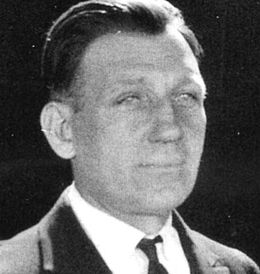Get Today in Masonic History into your Inbox. Sign up today for one of our email lists!
Need an article for your Trestleboard/Newsletter see our Use Policy
Samuel Louis "Sam" Warner is Born

Today in Masonic History Samuel Louis "Sam" Warner is born in 1887.
Samuel Louis "Sam" Warner was an American entertainment mogul.
Warner was born Schmuel "Wonsal" or "Wonskolaser" in the Kingdom of Poland under the Russian Empire on August 10th, 1887. At the age of 1, Warner would immigrate to America, specifically Baltimore, Maryland, with his family. His father, who had preceded the family, had a hard time making enough money to take care of the family. He would move them for two years to Canada and then back to Baltimore. Finally they would follow Warner's older brother Harry to Ohio.
Warner was the first member of the family to enter the entertainment business. In the early 1900s he would "take over" the city's Old Grand Opera House which he and his partner would use as a venue for "cheap vaudeville and photoplays". The venture would only last the summer. Warner would then secure a job as a projectionist at a local amusement park. He would truly become interested in film when he saw Thomas Edison's The Great Train Robbery. Warner would buy a Model B Kinetoscope from a "down on his luck" projectionist for $1,000 so that he could start showing films himself. Warner and his brother Albert would show The Great Train Robbery at fairs and carnivals around Ohio and Pennsylvania.
In 1905, Warner would convince his older brother Harry to join Albert and himself in the entertainment industry. They would purchase theaters in Pennsylvania. Eventually they would go into film distribution. They would be later joined by their brother Jack. The company would lucrative until the of Thomas Edison's Motion Picture Patents Company was started. The Patents Company also known as the Edison Trust, would charge huge fees to theaters looking to show Edison films. The Warners would sell off their movie theatre and go strictly into distribution, aligning themselves with an independent film production company.
In 1910, Warner and his brothers would expand their distribution business to the west coast. In 1918 the opportunity arose for them to produce their own movie, which the did. It wasn't until 1923 that Warner Brothers, Inc would be officially established.
In 1925, Warner tried to convince his brother Harry to start using a technology produced by Western Electric. Warner worked hard to convince his brother to sign a deal with Western Electric to own the exclusive rights to produce sound films with the technology. Eventually Harry would agree to the deal. Unfortunately Western Electric executives were anti-semitic and the deal almost fell through, when at a dinner with executives, Warner's wife Lina, who was Catholic, wore a crucifix to the dinner.
Harry Warner allowed the new technology to be used in a limited fashion, not trusting the technology. When the studio began to slump, Harry finally gave the go ahead to Warner to make a sound picture. The movie was The Jazz Singer, starring Al Jolson. It would break new ground in Hollywood and would be the start of the talking motion picture (talkies).
Unfortunately, Warner would not live to see the debut of the movie. During the making of the film, Warner had fallen ill and it was discovered that he had several abscesses and the infections had spread to his brain. After several surgeries to remove the infection, Warner slipped into a coma and passed away on October 5th, 1927.
Warner was a member of Mount Olive Lodge No. 506 in California.
This article provided by Brother Eric C. Steele.

